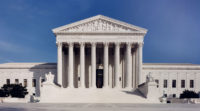Whether the U.S. Supreme Court will curtail or completely overturn federal courts’ ability to defer to federal agency experts when their rules to interpret ambiguous U.S. laws are legally challenged remains the looming question after oral arguments held Jan. 17 in two cases against the nearly 40-year old precedent.
Either way, the high court decision expected in June will have a real impact on agency decisions particularly in environmental, energy and labor regulation, says a former U.S. Justice Dept. attorney who spoke to ENR.
At issue is the so-called Chevron doctrine, settled by the high court in the 1984 Chevron USA Inc. v Natural Resources Defense Council decision, which says a court should defer to the agency charged with administering a federal law for interpretive rules if deemed reasonable even if the court might have ruled otherwise. This allows professional and politically accountable agency staff with expertise to craft effective policies, according to advocacy group EarthJustice.
“The Chevron deference doctrine recognizes that administrative agencies tasked with implementing complex, often scientific, statutes have insights and experience interpreting those statutes that generalist judges lack,” the environmental law group said. Conservatives were long-time supporters of Chevron but now see it as having given rise to the “administrative state," it added.
Justices Views Aired
The cases, Relentless v. Department of Commerce and Loper Bright Enterprises v. Raimondo involve challenges to regulations set by the U.S. Commerce Dept. from commercial fisheries that oppose required payment for monitoring to prevent overfishing.
With the court's conservative super-majority, modifications can be expected, Larry Liebesman, the former federal attorney and now senior advisor at policy consultant Dawson & Associates, told ENR. Two justices during oral argument appeared to be seeking a way to rationalize eliminating Chevron, he said.
But more liberal justices noted that Congress cannot expect courts to conduct “de novo” reviews—meaning they would start fresh without referencing previous decisions—which is a reason to defer to agencies, Liebesman said. Total elimination could create problems where expertise is needed, he added.
"I'm worried about the courts becoming uber legislators," Justice Ketanji Brown Jackson said, noting a result if law interpretation shifts away from federal agency experts to judges.
There are legitimate reasons why Congress cannot answer every issue itself, Justice Amy Coney Barrett said during the session. She also said overturning Chevron could encourage a “flood of litigation” challenging long-standing regulations.
U.S. Solicitor General Elizabeth Prelogar, representing the Biden Administration, warned that eliminating Chevron would be an “unwarranted shock to the legal system,” stating that 77 previous cases before the high court have relied on it.
The doctrine also places judges in a position of interpreting laws without scientific or technical expertise, she noted. A liberal justice said courts would need a “secret decoder ring” to interpret Congressional meaning.
The Supreme Court ruling could have a major impact on how the U.S. Army Corps of Engineers administers the "Waters of the United States" rule governing wetland regulation and how the U.S. Environmental Protection Agency regulates state water quality certification under the Clean Water Act, Liebesman said. Those rules will impact permitting for many development activities in energy, mining, infrastructure and housing, he added.
In their regulatory enforcement of those rules, EPA and the Corps rely on a “hydrologic connection” test that is not defined but is instead based on technical studies and data to determine how requirements would apply to a project. Should the Supreme Court overturn or modify Chevron, the agencies may no longer be able to rely on technical data and studies to insure compliance with the Clean Water Act, Liebesman said. “Failure to define those terms will likely cause confusion as to the scope of federal regulation and cause delay and expense in permitting for many projects,” he said.
The oral arguments focused primarily on Chevron and not merits of the claims by the fisheries, which were represented by ultra-conservative advocacy groups funded by opponents of federal regulation. Chevron is seen by opponents as promoting the growth of the administrative state, but Liebesman said it is hard to say whether eliminating the doctrine would benefit one side or the other of the U.S. political divide,
Political changes in the White House in recent years have generated major impacts in environmental rulemaking, Liebesman noted that the Trump Administration’s 2020 rule related to water quality certification for federal permits reversed a longstanding broader EPA policy, but it was reinstated by the the Biden Administration.
The new rule was challenged recently by 16 states and industry groups that claim the current administration’s decision to reinstate EPA’s long-standing interpretation of the Clean Water Act exceeded its authority under the law.
Should the Court overturn or modify Chevron, lower courts might not give deference to the administration’s interpretation that could affect "federal and state permitting for many projects that have broad water quality impacts,” Liebesman said.
Changes to Chevron could also "profoundly weaken" federal regulatory authority to limit climate change and ban use of toxic chemicals, experts in environmental law told the New York Times. Others noted key risks in not preserving the 40-year-old framework long regarded as settled law. “If the Supreme Court engages in too much overruling of doctrines it has previously embraced, no one will take seriously what the court proposes to put in their place,” said Thomas Merrill, professor of law at Columbia University and an expert on administrative law.
Texas DOT Suit Also Reviewed
The high court also heard oral arguments in a case that could affect whether states must pay compensation to landowners whose property was damaged by public project execution.
The case involves flooding damage to property caused by a Texas Dept. of Transportation overpass design on Interstate-10 that caused the structure to act as a dam and trap rainwater from Hurricane Harvey in 2017 and Tropical Storm Imelda in 2019. The solid concrete traffic median centerline barrier blocked the water from flowing away from the properties, complainants said.
Most eminent domain compensation is paid when the government condemns land, but in this case the damage is considered an “inverse condemnation”—meaning the land was not condemned but damaged by later actions. California has seen such lawsuits against utilities for wildfires caused by downed power lines.
Texas says it is immune from paying compensation.
The Supreme Court must resolve a difference between two U.S. appeals court decisions and decide if property owners can only sue the state if Congress passes a law to allow such litigation, or if compensation is guaranteed by the Bill of Rights and cannot be limited or diminished.
The Pacific Law Center, a property rights advocacy group that petitioned the high court to take the case for the plaintiffs, said justices could resolve the confusion by holding that the Constitution’s “just compensation clause” is “self-executing.” That means states may not immunize themselves from the constitutional mandate to pay the compensation.
The court appears ready to side with property owners, with justices sounding skeptical of the Texas arguments, a law center expert said.
Justice Elena Kagan said it appears the state is violating the Constitution "every day," with its approach, but Chief Justice John Roberts said in previous decisions, the court ruled that “the Constitution of its own force furnishes the basis for a court to award money damages,” and that Texas seemed to put landowners in a “catch-22.”
A ruling also is expected by June in Richard Devillier v. Texas.





Post a comment to this article
Report Abusive Comment